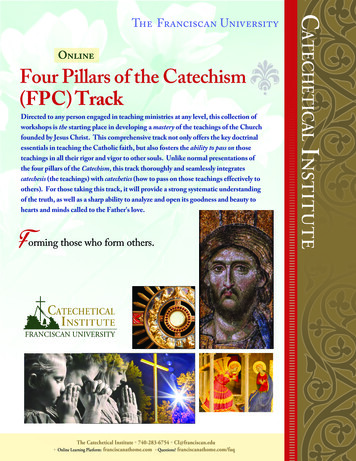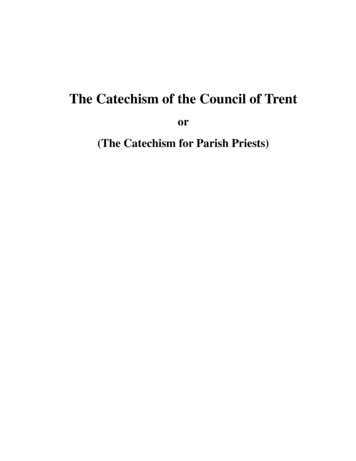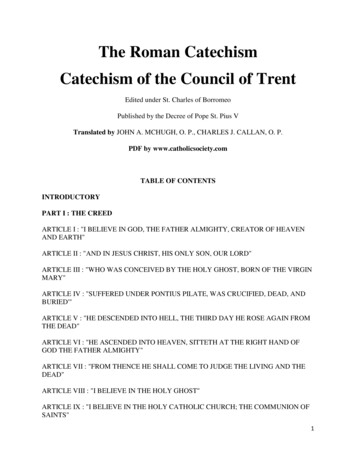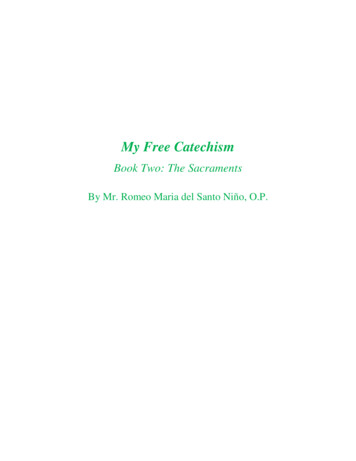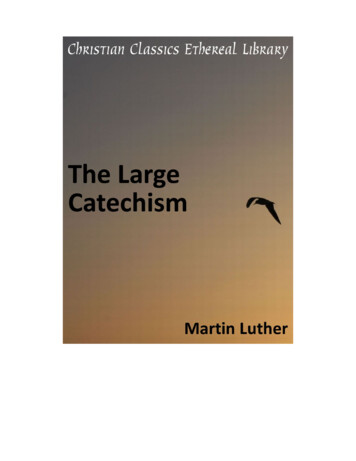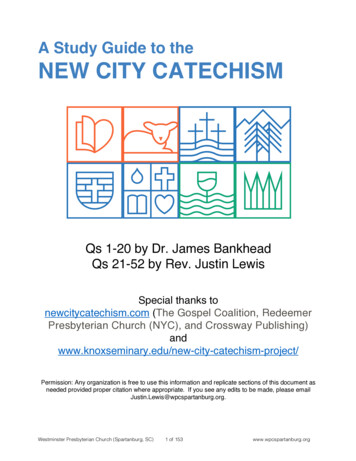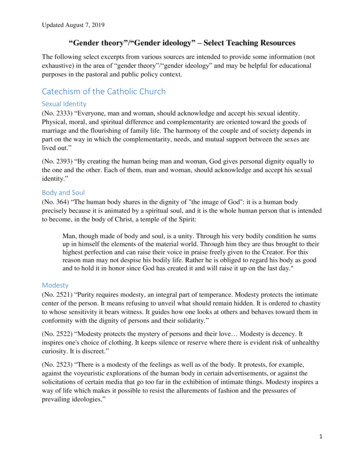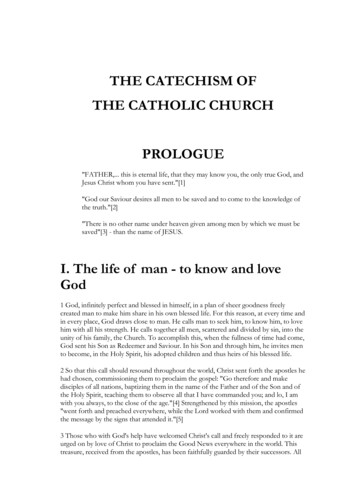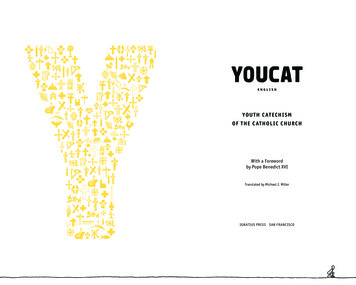
Transcription
englishY O U T H C AT E C HI S MO F T HE C AT H O L IC C HUR C HWith a Forewordby Pope Benedict XVITranslated by Michael J. MillerIgnAT IUs Press sAn Fr AnCIsCO
Original german edition:YOUCAT deutschJugendkatechismus der Katholischen Kirche 2010 by Pattloch Verlag gmbH & Co. Kg, Munich, germanycontentsFORE wORdLetter from Pope Benedict XVInihil Obstat, March 3, 2010Austrian Bishops’ Conference Imprimatur, Austrian Bishops’Conference with the approval of the german Bishops’ Conference,november 29, 2010; the swiss Bishops’ Conference, December6, 2010 with the prior approval of the Congregation for theDoctrine of the Faith, the Congregation for the Clergy, andthe Pontifical Congregation for the Laity.Instructions for UseSymbols and Their Meaning:Citation from sacred scriptureQuotations from various authors, including saintsand other Christian authorsDefinitionsWhy We Are Able to Believe 14 Man Is receptive to god 14 god ApproachesUs Men 16 Men respond to god 25 The Christian Profession of Faith 27I Believe in god the Father 31 I Believe in Jesus Christ, the OnlyBegotten son 51 I Believe in the Holy spirit 73PAR T T wOHow We Celebrate the Christian Mysteries 101god Acts in Our regard by Means of sacred signs 102 god and the sacredLiturgy 104 How We Celebrate the Mysteries of Christ 108The seven sacraments of the Church The sacraments of Initiation(Baptism, Confirmation, and eucharist) 116 The sacraments of Healing(reconciliation and the Anointing of the sick) 133 The sacraments ofCommunion and Mission (Holy Orders and Marriage) 143 Other LiturgicalCelebrations 156How We Are to Have Life in Christ 161Why We Are Put on earth, What We Are supposed to Do, and How god’s Holyspirit Helps Us to Do It 162 The Dignity of the Human Person 162 HumanCommunity 180 The Church 190 The Ten Commandments 193 You shallLove the Lord Your god with All Your Heart, and with All Your soul, and withAll Your Mind 193 You shall Love Your neighbor as Yourself 202PAR T FOURHow We should Pray 257Prayer in Christian Life 258 How to Pray: The gift of god’s Presence 258 The sources of Prayer 270 The Way of Prayer 274The Lord’s Prayer: The “Our Father” 280IndE x 2011 by Ignatius Press, san FranciscoAll rights reservedIsBn 978-1-58617-516-0Library of Congress Control number 2010931314Printed in the United states of America45PAR T T HREEsee definition given for the termLayout, Design, Illustrations by Alexander von Lengerke, Cologne, germanyCOnTEnT SThe Youth Catechism, which is written in language suitable for young people,deals with the entire Catholic faith as it was presented in the Catechism ofthe Catholic Church (CCC of 1997), without aiming, however, at the completeness provided in that volume. The work is structured in Question-andAnswer format, and numbers after each answer refer the reader to the moreextensive and in-depth treatments in the CCC. A commentary following theanswer is meant to give the young person additional help in understandingthe questions that are discussed and their significance in his life. Furthermore, the Youth Catechism offers in the margin a continuous series of supplementary elements, such as pictures, summary definitions, citations fromSacred Scripture, quotations from saints and reliable teachers of the faithbut also from non-religious authors. At the conclusion of the book, there isan index of subjects and persons to facilitate finding specific topics.PAR T OnEWhat We Believe 13subject Index 288 Definitions Index 298Abbreviations 300 Acknowledgments 301
FOre WOrDP O P e Be ne DI C T X V Idear young friends!Today I recommend for your reading an unusual book. It isunusual both because of its content and because of the wayit came to be. I would like to tell you a little about how it waswritten, because then it will be clear why it is so unusual.67POPe BeneDIC T X V IAt that time Pope John Paul II made a bold decision. Hedecided that bishops from all over the world should togetherwrite a book in which they would answer these questions. Hegave me the task of coordinating the work of the bishops andseeing to it that from the contributions of the bishops a bookwould result—a real book, not just a haphazard collectionof all sorts of documents. This book would have the oldfashioned title Catechism of the Catholic Church but would besomething entirely new and exciting. It would show what theCatholic Church believes today and how one can with goodreason believe.FOREwORdYou could say that it came to be from another work, whoseorigins go back to the 1980s. It was a difficult time for theChurch and for society worldwide. new guidance was neededto find the path to the future. After the second Vatican Council(1962–1965) and in a changed cultural situation, many peoplewere confused about what Christians actually believe, whatthe Church teaches, whether in fact she can teach anything atall, and how everything can find its place in a culture that hadchanged from its very foundations. Is it still reasonable todayto be a believer? These were the questions that even goodChristians were asking.
We met for a week three or four times a year and vigorouslydiscussed the different individual sections that had takenshape in between meetings. First, of course, we had todetermine the structure of the book. It had to be simple sothat the individual groups of authors that we establishedwould have a clear task and would not have to force their workinto a complicated system. It is the same structure you will findin this book. It is simply taken from centuries of catecheticalexperience: What we believe—How we should celebrate theChristian mysteries—How we have life in Christ—How weshould pray. I will not describe now how we slowly made ourway through so many and varied questions until finally a bookcame from it all. One can, of course, criticize some things oreven many things in such a work: everything that man makes isinadequate and can be improved. still it is a marvelous book:a witness to unity in diversity. We were able to form a singlechoir from many voices because we had the same score, thefaith that the Church has borne through the centuries from theapostles onward.In the World Youth Days since the introduction of the Catechismof the Catholic Church—rome, Toronto, Cologne, sydney—young people from all over the world have come together,young people who want to believe, who are seeking god, wholove Christ, and who want fellowship on their journey. In thiscontext the question arose: should we not attempt to translatethe Catechism of the Catholic Church into the language ofyoung people? should we not bring its great riches into theworld of today’s youth? Of course, there are many differenceseven among the youth of today’s world. And so now, underthe capable direction of the Archbishop of Vienna, ChristophCardinal schönborn, YOUCAT has been produced for youngpeople. I hope that many young people will let themselves befascinated by this book.Why am I telling you all this? We realized at the time we wereworking on the book that not only are the continents andMany people say to me: The youth of today are not interestedin this. I disagree, and I am certain that I am right. The youthof today are not as superficial as some think. They want toknow what life is really all about. A detective story is excitingbecause it draws us into the destiny of other men, a destinythat could be ours. This book is exciting because it speaks ofour own destiny and so deeply engages every one of us.89POPe BeneDIC T X V Icultures diverse, but that even within individual communitiesthere are again diverse “continents”: The worker thinksdifferently from the farmer; a physicist differently from aphilologist; an executive differently from a journalist; ayoung man differently from an old man. so we had to finda way of thinking and speaking that was in some way aboveall these differences, a common space, so to speak, betweendifferent worlds of thought. In doing this it became evermore apparent to us that the text needed to be “translated”for different cultural worlds in order to reach people in thoseworlds in ways that correspond to their own questions andways of thinking.FOREwORdI was alarmed by this task. I must admit that I doubted whethersomething like this could succeed. For how was it possible thatauthors scattered all over the world could together produce areadable book? How could men who not only geographicallybut also intellectually and spiritually lived on differentcontinents create a text with an inner unity, one that wouldalso be understandable throughout all those continents? Andthere was the further difficulty that these bishops would notbe writing as individual authors but would be in contact withtheir brother bishops and with the people in their dioceses. Imust admit that even today it still seems to me to be a miraclethat this project finally succeeded.
so I invite you: study this Catechism! That is my heartfeltdesire. This Catechism was not written to please you. It will notmake life easy for you, because it demands of you a new life.It places before you the gospel message as the “pearl of greatvalue” (Mt 13:46) for which you must give everything. so Ibeg you: study this Catechism with passion and perseverance.Make a sacrifice of your time for it! study it in the quiet of yourroom; read it with a friend; form study groups and networks;share with each other on the Internet. By all means continueto talk with each other about your faith.spirit, serve the Lord!” (rom 12:11). When Israel was at thelowest point in her history, god called for help, not from thegreat and honored ones of Israel, but from a young man by thename of Jeremiah. Jeremiah felt overwhelmed: “Ah, Lord god!Behold, I do not know how to speak, for I am only a youth” (Jer1:6). But god was not to be deterred : “Do not say, ‘I am only ayouth’; for to all to whom I send you you shall go, and whateverI command you you shall speak” (Jer 1:7).I bless you and pray each day for all of you.1011POPe BeneDIC T X V IIf you are now going to apply yourselves zealously to thestudy of the Catechism, I want to give you one last thing toaccompany you: You all know how deeply the communityof faith has been wounded recently through the attacks ofthe evil one, through the penetration of sin itself into theinterior, yes, into the heart of the Church. Do not make thatan excuse to flee from the face of god! You yourselves arethe Body of Christ, the Church! Bring the undiminished fireof your love into this Church whose countenance has so oftenbeen disfigured by man. “never flag in zeal, be aglow with theBenedictus P.P. XVIFOREwORdYou need to know what you believe. You need to know your faithwith that same precision with which an IT specialist knows theinner workings of a computer. You need to understand it like agood musician knows the piece he is playing. Yes, you need tobe more deeply rooted in the faith than the generation of yourparents so that you can engage the challenges and temptationsof this time with strength and determination. You need god’shelp if your faith is not going to dry up like a dewdrop in thesun, if you want to resist the blandishments of consumerism, ifyour love is not to drown in pornography, if you are not goingto betray the weak and leave the vulnerable helpless.
What We BelieveestionsQuPARt one1213Why We Are Able to Believe 14Man Is receptive to god 14god Approaches Us Men 16Man responds to god 25The Christian Profession of Faith 28I Believe in god the Father 31I Believe in Jesus Christ, the Only Begotten son of god 51I Believe in the Holy spirit 72
[god] desiresall men to besaved and to come to theknowledge of the truth.You cannotimagine at all how muchyou interest god; he isinterested in you as ifthere were no one elseon earth.One must knowman and human things inorder to love them. Onemust love god and divinethings in order to knowthem.god is love.1 Jn 4:16bwe are here on earth in order to know and to loveGod, to do good according to his will, and to gosomeday to heaven. [1–3, 358]To be a human being means to come from god and to goto god. Our origin goes back farther than our parents.We come from god, in whom all the happiness of heavenand earth is at home, and we are expected in hiseverlasting, infinite blessedness. Meanwhile we live onthis earth. sometimes we feel that our Creator is near;often we feel nothing at all. so that we might find theway home, god sent us his son, who freed us from sin,delivers us from all evil, and leads us unerringly intotrue life. He is “the way, and the truth, and the life”285(Jn 14:6).2sT. ALBerT THe gre AT(ca. 1200–1280, Dominicanpriest, scientist, and scholar,Doctor of the Church, and oneof the greatest theologians ofthe Church)Why did God create us?God created us out of free and unselfish love. [1–3]When a man loves, his heart overflows. He would like toshare his joy with others. He gets this from his Creator.Although god is a mystery, we can still think about himin a human way and say: Out of the “surplus” of his lovehe created us. He wanted to share his endless joy withus, who are creatures of his love.CHAP T ER OnEThe measure oflove is love withoutmeasure.sT. Fr AnC Is OF sALes(1567–1622, distinguishedbishop, brilliant spiritualguide, founder of a religiouscommunity, and Doctor of theChurch)The noblest powerof man is reason. Thehighest goal of reason isthe knowledge of god.who supports us absolutely, satisfies us absolutely, andemploys us absolutely in his service. A person is notcompletely himself until he has found god. “Anyonewho seeks truth seeks god, whether or not he realizes5, 281–285it” (st. edith stein).Man Is receptive to god3Why do we seek God?God has placed in our hearts a longing to seek andfind him. St. Augustine says, “You have made usfor yourself, and our heart is restless until it restsin you.” we call this longing for God Religion.[27–30]It is natural for man to seek god. All of our striving fortruth and happiness is ultimately a search for the one4Can we know the existence of God by our reason?Yes. Human reason can know God with certainty.[31–36, 44–47]The world cannot have its origin and its destinationwithin itself. In everything that exists, there ismore than we see. The order, the beauty, and thedevelopment of the world point beyond themselvestoward god. every man is receptive to what is true,good, and beautiful. He hears within himself the voiceThey [men]should seek god,in the hope that theymight feel after him andfind him. Yet he is not farfrom each one of us, for“In him we live and moveand have our being.“Acts 17:27–28a1415[I] C H A P T e r 1: M A n I s r e C e P T I V e T O g O DBL A Ise PAsC AL,(1623–1662, French mathematician and philosopher)For what purpose are we here on earth?PAR T OnE – WHAT We BeL Ie V eJUL Ien green(1900–1998, French writer)We can understandreligion generally tomean a relationshipto what is divine.A religious personacknowledges somethingdivine as the power thatcreated him and theworld, on which he isdependent and to whichhe is ordered. He wantsto please and honorthe Divinity by his wayof life.Why We Are Able to Believe11 Tim 2:4ReligionSEC T IOn OnE
so it happensthat men in suchmatters easily persuadethemselves that whatthey would not like to betrue is false or at leastdoubtful.POPe PIUs X I I encyclicalHumani generissomethingincomprehensible is notfor that reason less real.BL A Ise PAsC AL(1588–1651)Why do people deny that God exists, if they canknow him by reason?To know the invisible God is a great challenge forthe human mind. Many are scared off by it. Anotherreason why some do not want to know God is becausethey would then have to change their life. Anyonewho says that the question about God is meaninglessbecause it cannot be answered is making things too357easy for himself. [37–38]6Can we grasp God at all in concepts? Is itpossible to speak about him meaningfully?Although we men are limited and the infinite greatness of God never fits into finite human concepts, wecan nevertheless speak rightly about God.[39–43, 48]In order to express something about god, we use imperfect images and limited notions. And so everythingwe say about god is subject to the reservation that ourlanguage is not equal to god’s greatness. Therefore wemust constantly purify and improve our speech aboutgod.CHAP T ER T wOgod Approaches Us Men7Why did God have to show himself in order for usto be able to know what he is like?Man can know by reason that God exists, but not whatGod is really like. Yet because God would very muchlike to be known, he has revealed himself.[50–53, 68–69]god did not have to reveal himself to us. But he didit—out of love. Just as in human love one can knowsomething about the beloved person only if he openshis heart to us, so too we know something about8How does God reveal himself in theOld Testament?God shows himself in the Old Testament as God,who created the world out of love and remainsfaithful to men even when they have fallen away fromhim into sin. [54–64, 70–72]god makes it possible to experience him in history:With noah he establishes a covenant to save all livingthings. He calls Abraham so as to make him “the fatherof a multitude of nations” (gen 17:5b) and to bless“all the families of the earth” in him (gen 12:3b).The people Israel, sprung from Abraham, becomes hisspecial possession. To Moses he introduces himselfYhwh, usuallyby name. His mysterious nametranscribed Yahweh, means “I am who I am” (ex 3:14).He frees Israel from slavery in egypt, establishes acovenant with them on sinai, and through Moses givesthem the Law. Again and again, god sends prophetsto his people to call them to conversion and to therenewal of the covenant. The prophets proclaim thatgod will establish a new and everlasting covenant,which will bring about a radical renewal and definitiveredemption. This covenant will be open to all humanbeings.9What does God show us about himself whenhe sends his Son to us?God shows us in Jesus Christ the full depth of hismerciful love. [65–66, 73]Through Jesus Christ the invisible god becomes visible.He becomes a man like us. This shows us how far god’slove goes: He bears our whole burden. He walks everyReVelAT ionrevelation meansthat god opens himself,shows himself, andspeaks to the worldvoluntarily.We cannot talkabout god, but woe tothe one who remainssilent about him.sT. AUgUsT Ine(354–430, Doctor of theChurch, the most importantwriter and theologian of theearly Church)This is his [thetheologian’s] mission: inthe loquacity of our dayand of other times, inthe plethora of words, tomake the essential wordsheard. Through words,it means making presentthe Word, the Word whocomes from god, theWord who is god.POPe BeneDIC T X V I,October 6, 2006All that is saidabout god presupposessomething said by god.sT. eDI TH sTe In(1891–1942, JewishChristian, philosopher, andCarmelite nun, concentrationcamp victim)1617[I] C H A P T e r 2: g O D A P P r OAC He s Us Me nPOPe BeneDIC T X V I, January 9, 20065god’s inmost thoughts only because the eternal andmysterious god has opened himself to us out of love.From creation on, through the patriarchs and theprophets down to the definitive revelat ion in hisson Jesus Christ, god has spoken again and again tomankind. In him he has poured out his heart to us andmade his inmost being visible for us.PAR T OnE – WHAT We BeL Ie V eMan’s uniquegrandeur is ultimatelybased on his capacityto know the truth. Andhuman beings desire toknow the truth. Yet truthcan only be attained infreedom. This is the casewith all truth, as is clearfrom the history of science; but it is eminentlythe case with thosetruths in which man himself, man as such, is atstake, the truths of thespirit, the truths aboutgood and evil, about thegreat goals and horizonsof life, about our relationship with god. Thesetruths cannot be attained without profoundconsequences for theway we live our lives.of conscience, which urges him to what is good andwarns him against what is evil. Anyone who follows thispath reasonably finds god.
In Jesus Christ,god took on a humanface and became ourfriend and brother.POPe BeneDIC T X V I,september 6, 2006path with us. He is there in our abandonment, oursufferings, our fear of death. He is there when we cango no farther, so as to open up for us the door leading314into life.10incARnAT ionIn many andvarious waysgod spoke of old to ourfathers by the prophets;but in these last dayshe has spoken to us bya son.Apart from JesusChrist we do not knowwhat god, life, death,and we ourselves are.BL A Ise PAsC ALI have noimagination. I cannotpicture god the Father.All that I can see isJesus.BL. TeresA OF C ALCUT TA(1910–1997, foundress of theMissionaries of Charity, nobelPeace Prize winner)POPe BeneDIC T X V I,August 18, 2005In Jesus Christ, God himself came to earth. He isGod’s last word. By listening to him, all men of alltimes can know who God is and what is necessary fortheir salvation. [66–67]With the gospel of Jesus Christ, the revelat ion ofgod is perfect and complete. To make it comprehensibleto us, the Holy spirit leads us ever deeper into thetruth. god’s light breaks so forcefully into the lives ofmany individuals that they “see the heavens opened”(Acts 7:56). That is how the great places of pilgrimagesuch as guadalupe in Mexico or Lourdes in Francecame about. The “private revelations” of visionariescannot improve on the gospel of Jesus Christ. no oneis obliged to believe in them. But they can help usunderstand the gospel better. Their authenticity istested by the Church.11There is an urgentneed for the emergenceof a new generation ofapostles anchored firmlyin the word of Christ,capable of respondingto the challenges of ourtimes and prepared tospread the gospel farand wide.POPe BeneDIC T X V I,February 22, 2006through us and thus to generate the light of the world:JesUs—or to refuse to be used and, thus, allow the123darkness to spread.”Why do we hand on the faith?we hand on the faith because Jesus commands us:“Go therefore and make disciples of all nations”(Mt 28:19). [91]no genuine Christian leaves the transmission of thefaith exclusively to specialists (teachers, pastors,missionaries). We are Christ for others. This meansthat every genuine Christian would like god to cometo other people, too. He says to himself, “The Lordneeds me! I have been baptized and confirmed and amresponsible for helping the people around me to learnabout god and ‘to come to the knowledge of the truth’(1 Tim 2:4b).” Mother Teresa used a good comparison:“Often you can see power lines running alongside thestreet. Unless current is flowing through them, thereis no light. The power line is you and I! The current isgod! We have the power to allow the current to flow12How can we tell what belongs to the true faith?we find the true faith in Sacred Scripture and in theliving Tradition of the Church.[76, 80–82, 85–87, 97, 100]The new Testament developed out of the faith ofthe Church. scripture and Tradition belong together.Handing on the faith does not occur primarily throughdocuments. In the early Church it was said that sacredscripture was “written on the heart of the Churchrather than on parchment”. The disciples and theapostles experienced their new life above allthrough a living fellowship with Jesus. The earlyChurch invited people into this fellowship, whichcontinued in a different way after the resurrection.The first Christians held fast “to the apostles’ teachingand fellowship, to the breaking of the bread and to1819Mission(from Latin missio sending): Mission is theessence of the Churchand Jesus’ mandate toall Christians to proclaimthe gospel in word anddeed, so that all men canfreely make a decisionfor Christ.[I] C H A P T e r 2: g O D A P P r OAC He s Us Me nHeb 1:1–2With Jesus Christ, has everything been said,or does revelation continue even after him?PAR T OnE – WHAT We BeL Ie V e(from the Latincaro, carnis flesh,“becoming flesh”): god’sact of becoming man inJesus Christ. This is thefoundation of Christianfaith and of hope for theredemption of mankind.The happinessyou are seeking, thehappiness you have aright to enjoy, has aname and a face: it isJesus of nazareth.
estionsQuPARt t WoHow We Celebratethe Christian Mysteries100101god Acts in Our regard by Means of sacred signs 102god and the sacred Liturgy 104How We Celebrate the Mysteries of Christ 108The sacraments of Initiation(Baptism, Confirmation, and eucharist) 116The sacraments of Healing(reconciliation and the Anointing of the sick) 133The sacraments of Communion and Mission(Holy Orders and Marriage) 143Other Liturgical Celebrations 156
Lord used to speak to Moses face to face, as a manspeaks to his friend” (ex 33:11a). Before Moses actedor instructed the people, he withdrew to the mountainto pray. Thus he is the original example of contemplative prayer.Contemplata aliistradere. (To contemplateand to give to others thefruits of contemplation.)Motto of the Dominican Order473How are the Psalms important for our prayer?The Psalms, along with the Our Father, are part of theChurch’s great treasury of prayers. In them the praiseof God is sung in an ageless way.conTeMpl AT ionThere are 150 Psalms in the Old Testament. Theyare a collection of songs and prayers, some of themseveral thousand years old, which are still prayed todayin the Church community—in the so-called Liturgy ofthe Hours. The Psalms are among the most beautifultexts in world literature and move even modern readers188immediately by their spiritual power.474How did Jesus learn to pray?472How did Moses pray?From Moses we learn that “praying” means “speakingwith God”. At the burning bush God entered into areal conversation with Moses and gave him an assignment. Moses raised objections and asked questions.Finally God revealed to him his holy name. Just asMoses then came to trust God and enlisted wholeheartedly in his service, so we too should pray andthus go to God’s school. [2574–2577]The bible mentions Moses’ name 767 times—socentral is he as the liberator and lawgiver of the peopleof Israel. At the same time Moses was also a greatintercessor for his people. In prayer he received hiscommission; from prayer he drew his strength. Moseshad an intimate, personal relationship with god: “TheJesus, who was god and man at the same time, grew uplike other Jewish children of his time amid the ritualsand prayer formulas of his people, Israel. nevertheless,as the story of the twelve-year-old Jesus in the Templedemonstrated (Lk 2:41ff.), there was something in himthat could not be learned: an original, profound, andunique union with god, his Father in heaven. Like allother men, Jesus hoped for another world, a hereafter,and prayed to god. At the same time, though, hewas also part of that hereafter. This occasion alreadyshowed that one day people would pray to Jesus,acknowledge him as god, and ask for his grace.475How did Jesus pray?Jesus’ life was one single prayer. At decisive moments (his temptation in the desert, his selection of“Did you notknow that Imust be in my Father’shouse?”260Lk 2:49261To pray meansto think lovingly aboutJesus. Prayer is thesoul’s attention that isconcentrated on Jesus.The more you love Jesus,the better you pray.BL. CHArLes De FOUC AULD(1858–1916)[I] C H A P T e r 1: H O W T O P r AY: T He g I F T O F g O D's P r e se n C eJesus learned to pray in his family and in the synagogue. Yet Jesus broke through the boundaries oftraditional prayer. His prayer demonstrates a unionwith his Father in heaven that is possible only tosomeone who is the Son of God. [2598–2599]Ps 23PAR T F OUR – HOW We sHOUL D P r AY(from Latincontemplare becomingabsorbed in god’spresence in prayer.Contemplation (theinterior, spiritual life)and action (the activelife) are two sides ofdevotion to god. InChristianity the twobelong inseparablytogether.The Lord is myshepherd, /I shall not want;/ hemakes me lie down ingreen pastures. / Heleads me beside stillwaters; / he restores mysoul. / He leads me inpaths of righteousnessfor his name’s sake./ even though I walkthrough the valley ofthe shadow of death, / Ifear no evil; / for you arewith me; / your rod andyour staff, they comfortme.
subject IndexThe numbers in this index refer to the numbers of the individual questions.A number printed in bold gives the main reference; other numbers indicatefurther discussion.218, 488Church as People of God 121, 125, 128, 138,Bread, daily 522, 523191, 204Brothers and sisters of Jesus 81Church as Temple of the Holy Spirit 119,Burial 394128, 189Business ethics 428Church building 189, 190, 214, 498Church, catholicity of the 133, 134Atheism 5, 357Canon of Sacred Scriptures 14Church, collegiality of the 140Abba, dear Father 38, 290, 477Authority 325, 326, 329, 367, 375, 392,Capital/capitalism 331, 435, 439, 442Church, divisions in the 130, 131, 267Abortion 237, 292, 379, 383, 421, 498399, 446Cardinal virtues 300Church, hierarchical structure of the 140,Absolution 231, 233, 237, 239, 458Authority from Christ 92, 139–144, 242, 249Catechumenate 196413Abuse, sexual 386, 410Authority of the Pope 141Catholic 130, 133, 134, 220, 222, 267–268Church, holiness of the 124, 132Adam and Eva 66, 68Ave Maria 480Catholic social teaching 323Church, infallibility of the 13, 143Celebrant 215Church, local 141, 253Addiction 287, 389Baptism, prerequisite for 196Celibacy 255, 258, 261Church, nature of the 125Adoration 149, 218, 461, 483, 485Baptism 130, 151, 193, 194–202Chance 20, 43Church, origin of the term 121Adultery 424Baptism, the only way to salvation? 199Charism 113, 119, 120, 129, 257, 393Church, precepts of 345Agnus dei 214Baptism, formula of 195Charity 305, 309Church, structure of the 138AIdS 414Baptismal name 201, 361Chastity 311, 404–406, 463Church, task of the 123, 150Alleluia 214Baptism, minister of 198Chastity for single persons 145Church, unity and uniqueness of the 129,Alms 345, 447, 449Baptism, administration of 195Child soldiers 435141Altar
beg you: study this Catechism with passion and perseverance. Make a sacrifice of your time for it! s tudy it in the quiet of your room; read it with a friend; form study groups and networks; share with each other on the Internet. By all means continue to talk with each other about your faith. You need to know what you believe.
